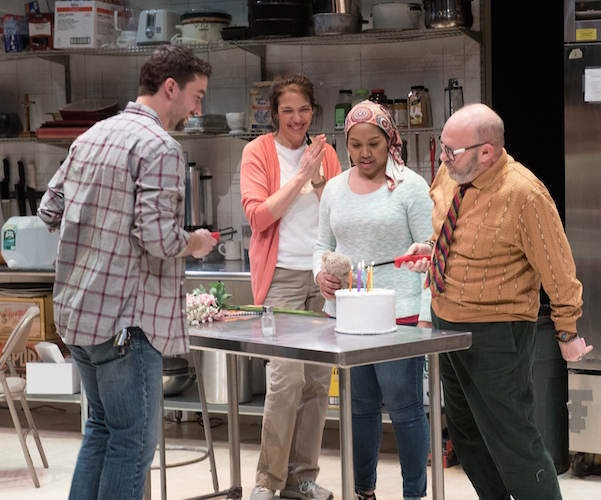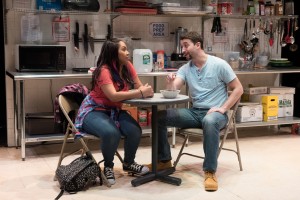Theater Review: “Grand Concourse” — You Gotta Have Faith
Grand Concourse does some wondrous things: it encourages us to ponder our own growth toward faith while witnessing the struggle of others to gain or regain theirs.
Grand Concourse by Heidi Schreck. Directed by Bridget Kathleen O’Leary. Staged by Speakeasy Stage Company, Calderwood Pavilion at Boston Center for the Arts, 527 Tremont Street, Boston, MA, through April 1.

Oscar (Alejandro Simoes), Shelley (Melinda Lopez), Emma (Ally Dawson), and Frog (Thomas Derrah) in the SpeakEasy Stage Company production of “Grand Concourse.” Photo: Glenn Perry.
By Robert Israel
Faith, Gandhi once observed, is “not something to grasp” but, rather, “a state to grow into.”
The characters that populate Heidi Schreck’s thoughtful, tersely funny, and compelling one-act play live on the fringes of faith. Their spiritual growth, for the most part, has been pretty well thwarted. Their challenges are manifold: they are struggling with self-doubt, bowled over by life’s uncertainties, mentally challenged, or are unable to re-connect to a mainstream source of belief. The upshot is that they have been led to question whether they have lost their faith, for good.
Rationalizations, excuses, and escapist wishes have made belief in the reality of the transcendent very difficult. What gives Grand Concourse its emotional resonance is that the doubts that afflict Schreck’s characters reflect the kinds of uncertainty that all of us suffer from in varying degrees; these figures are, consciously or unconsciously, on a quest to tap into an inner wellspring of faith, a moral strength that gives clarity to their – and our — lives.
The play is set in an “industrial kitchen in a Bronx church” (the play’s title — Grand Concourse – refers to the main artery that leads to a house of worship and soup kitchen). Shelley (Melinda Lopez) is a nun who no longer wears her religious robes; we initially see her preparing meals to serve the poor who flock to the church in search of a daily meal. Yet it quickly becomes clear to her (and to us) that she is not nourished by her faith. She says her prayers as she presses a keys on the microwave — and she doesn’t give herself enough time to complete her prayers. When the buzzer rings, she remains estranged from her religion, cut off from the faith she has sworn allegiance to.
Into this kitchen comes nineteen-year-old Emma (Ally Dawson), who is seeking a volunteer position slicing and dicing and sweeping. We also meet Oscar (Alejandro Simoes), who serves as a custodian and all-around handyman for the church. The fourth character is one of the “guests,” Frog (Thomas Derrah). The script’s conflict revolves around whether these four characters can successfully (and safely) interact. Is the Christian spirit (of civility, compassion, acceptance, and, most importantly, forgiveness) present in this church? Or will internecine conflicts and pettiness prevail? These questions are on the table as the characters prepare mock meals.
Director Bridget Kathleen O’Leary brings deft timing to the play’s succession of personal crises. The compact structure of the one-act works remarkably well, concentrating on the spiritual explorations that make up the serious core of the play, though Schreck is savvy enough to the ways of the world to add much needed levity.
The acting is first-rate throughout. Lopez uses remarkable restraint: she makes the character’s emotional conflicts palpable yet nuanced, letting us feel the anguished yet repressed tremblings of a woman of faith who is wracked by turmoil, doubt, and fear. Lopez never lets us feel that, as a performer, she is working to make an impression. This is a warmly sympathetic portrait of an embattled woman who is struggling to reclaim her faith.
Ally Dawson’s Emma is a nimble combination of light, warmth, and surprising sexual allure. The object of her desire, Oscar, is taken aback by her seductive skills. Simoes responds with a sweet and entertaining innocence. As Frog, veteran actor Thomas Derrah is as dependable as always. He has the funniest lines in the play, yet he never panders to playing up to the obscene (or playing for easy laughs).
The set design by Jenna McFarland Lord hits all the right notes, from the signs that ask workers to wash their hands to the large refrigerators loaded with oversized containers of processed food. (It reminded me of where I volunteer every Christmas, serving dinner to fifty or more homeless adults in downtown Boston.) The lighting and costumes — by Karen Perlow and Chelsea Kerl, respectfully – are also effective.
Grand Concourse does some wondrous things: it encourages us to ponder our own growth toward faith while we empathize with the struggle of others to gain — or regain — theirs.
Robert Israel writes about theater, travel, and the arts, and is a member of Independent Reviewers of New England (IRNE). He can be reached at risrael_97@yahoo.com.
Tagged: Bridget Kathleen O’Leary, Grand Concourse, Heidi Schreck, Melinda-Lopez, SpeakEasy Stage Company

